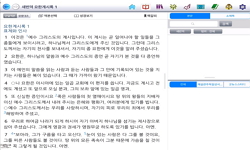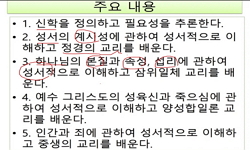In the Christian tradition, divine revelation is ‘God’s self-disclosure’ and God reveals Himself through the Bible. The Bible records the ‘speech of God’ and the ‘acts of God’, and God reveals who He is through his ‘word-actions’. In...
http://chineseinput.net/에서 pinyin(병음)방식으로 중국어를 변환할 수 있습니다.
변환된 중국어를 복사하여 사용하시면 됩니다.
- 中文 을 입력하시려면 zhongwen을 입력하시고 space를누르시면됩니다.
- 北京 을 입력하시려면 beijing을 입력하시고 space를 누르시면 됩니다.

언어 담론으로서의 계시 ― 언어행위이론(Speech Act Theory)의 관점에서 = Revelation as a Discourse of Language: From the Viewpoint of Speech Act Theory
한글로보기부가정보
다국어 초록 (Multilingual Abstract)
First, revelation is a ‘communicative act between God and believer’ as ‘discourse of language’ of God. This explains how the revelation of the Word of God transforms the lives of believers and gives an understanding of the linguistic interpretation of the revelation (faith, practical implication).
Second, revelation is God’s language event that includes both the reason and the experience of faith, and it is an event of faith. Thus, revelation represents both the propositional statements of reason and the empirical statements of faith.
Third, the Bible is God’s Word written by God-inspired Bible reporters, confirming our faith and restoring the authority of the Bible (Word).
In the Christian tradition, divine revelation is ‘God’s self-disclosure’ and God reveals Himself through the Bible. The Bible records the ‘speech of God’ and the ‘acts of God’, and God reveals who He is through his ‘word-actions’. In other words, God reveals himself as ‘language’ to us and acts through ‘language’ (language event). Thus, revelation is not a theoretical or propositional knowledge of God, but an experience of practical and experiential faith. Revelation, therefore, involves “communication between the personality”, between God and the believer. In other words, revelation is ‘communication act’ between God and the believer as ‘discourse of language’ of God. Although systematic theology considers revelation (biblical) as a divine discourse or communication between God and the believer, it does not know how the divine discourse of God becomes real and influential in the lives of believers. It seems that they do not fully explain what implications they have in theology (faith). Therefore, this paper proposes to examine ‘revelation as a discourse of language’ through the Speech Act Theory to present the answer to this. If we illuminate revelation as a discourse of language as a speech act theory, the following three hermeneutical contributions to revelation are expected.
First, revelation is a ‘communicative act between God and believer’ as ‘discourse of language’ of God. This explains how the revelation of the Word of God transforms the lives of believers and gives an understanding of the linguistic interpretation of the revelation (faith, practical implication).
Second, revelation is God’s language event that includes both the reason and the experience of faith, and it is an event of faith. Thus, revelation represents both the propositional statements of reason and the empirical statements of faith.
Third, the Bible is God’s Word written by God-inspired Bible reporters, confirming our faith and restoring the authority of the Bible (Word).
국문 초록 (Abstract)
조직신학에서 계시(성서)를 신적 담화(언어 담론) 혹은 하나님과 신자 간의 커뮤니케이션 행위라고 간주하고 있음에도 불구하고 어떻게 하나님의 신적 담화가 신자들의 삶에서 실재가 되며, 어떠한 영향을 일으키는지, 신적 커뮤니케이션 행위가 신학(신앙)적으로 어떠한함의를 가지는지에 대하여 충분히 설명하지 못하고 있는 것으로 보인다. 따라서 본 논문은 이것에 대한 답변을 제시하고자 언어행위이론을 통하여 ‘언어 담론으로서의 계시’를 고찰할 것을 제안한다. 언어 담론으로서 계시를 언어행위이론으로 조명한다면 다음과 같은세 가지 계시의 해석학적 공헌이 예상된다.
첫째, 계시는 하나님의 ‘언어 담론’으로서 하나님과 신자 간의 ‘상호인격적인 커뮤니케이션 행위’이다. 이는 하나님 말씀의 계시가 신자들의 삶을 어떻게 변혁시키는지 설명하며 (신앙적, 실천적 함의) 계시의 성령론적 관점에 대한 언어학적 해석의 이해를 준다.
둘째, 계시는 이성과 신앙의 경험을 모두 포함하는 하나님의 언어사건이며, 신앙의 사건이다. 따라서 계시는 이성의 명제적 진술과 신앙의 경험적 진술 모두를 나타낸다.
셋째, 성서는 하나님의 영감을 받은 성서 기자들에 의해 쓰인 하나님의 말씀으로서(신-인 협력 담론, double agency discourse) 우리의 신앙을 확증하고 성서(말씀)의 권위를 회복한다.
기독교 전통에서 계시는 ‘하나님의 자기 드러냄’(self-disclosure)이며 하나님은 성서를 통해 자신을 계시하신다. 성서는 하나님의 말씀(speech)과 하나님의 행위(act)가 기록되어 있으며 하나님...
기독교 전통에서 계시는 ‘하나님의 자기 드러냄’(self-disclosure)이며 하나님은 성서를 통해 자신을 계시하신다. 성서는 하나님의 말씀(speech)과 하나님의 행위(act)가 기록되어 있으며 하나님은 자신의‘말-행동’을 통해 하나님 자신이 어떠한 분이신지를 나타낸다. 즉 하나님은 우리에게 ‘언어’로 자신을 계시하시며 ‘언어’를 통해 행동하신다 (언어사건). 따라서 계시는 하나님에 대한 이론적 명제적 지식이라기보다 실천적이며 경험적인 신앙의 체험사건이다. 그러므로계시는 하나님과 신자 사이의 ‘상호 인격 간의 소통’을 수반한다. 즉계시는 하나님의 ‘언어 담론’으로서 하나님과 신자 간의 ‘커뮤니케이션 행위’이다.
조직신학에서 계시(성서)를 신적 담화(언어 담론) 혹은 하나님과 신자 간의 커뮤니케이션 행위라고 간주하고 있음에도 불구하고 어떻게 하나님의 신적 담화가 신자들의 삶에서 실재가 되며, 어떠한 영향을 일으키는지, 신적 커뮤니케이션 행위가 신학(신앙)적으로 어떠한함의를 가지는지에 대하여 충분히 설명하지 못하고 있는 것으로 보인다. 따라서 본 논문은 이것에 대한 답변을 제시하고자 언어행위이론을 통하여 ‘언어 담론으로서의 계시’를 고찰할 것을 제안한다. 언어 담론으로서 계시를 언어행위이론으로 조명한다면 다음과 같은세 가지 계시의 해석학적 공헌이 예상된다.
첫째, 계시는 하나님의 ‘언어 담론’으로서 하나님과 신자 간의 ‘상호인격적인 커뮤니케이션 행위’이다. 이는 하나님 말씀의 계시가 신자들의 삶을 어떻게 변혁시키는지 설명하며 (신앙적, 실천적 함의) 계시의 성령론적 관점에 대한 언어학적 해석의 이해를 준다.
둘째, 계시는 이성과 신앙의 경험을 모두 포함하는 하나님의 언어사건이며, 신앙의 사건이다. 따라서 계시는 이성의 명제적 진술과 신앙의 경험적 진술 모두를 나타낸다.
셋째, 성서는 하나님의 영감을 받은 성서 기자들에 의해 쓰인 하나님의 말씀으로서(신-인 협력 담론, double agency discourse) 우리의 신앙을 확증하고 성서(말씀)의 권위를 회복한다.
참고문헌 (Reference)
1 Searle, John R., "The Philosophy of Language" Oxford University Press 39-51, 1971
2 Donald D Evans, "The Logic of Self-Involvement" SCM Press 1963
3 Vanhoozer, Kevin J, "The Drama of Doctrine : A Canonical-Linguistic Approach to Christian Theology" Westminster John Knox Press 2005
4 Mackey, James P, "The Critique of Theological Reason" Cambridge University Press 2000
5 Tillich, Paul, "Systematic Theology Vol.1" University of Chicago Press 1951
6 Thiemann, Ronald F, "Revelation and Theology : The Gospel as Narrated Promise" University of Notre Dame Press 1985
7 Barr, James, "Old and New in Interpretation : A Study of the Two Testaments" SCM 1982
8 Green, Garrett, "Imagining God : Theology and the Religious Imagination" Harper & Row 1989
9 Austine, John L., "How to Do Things with Words" Harvard University Press
10 Vanhoozer, Kevin J, "First Theology : God, Scripture and Hermeneutics" Apollos 2002
1 Searle, John R., "The Philosophy of Language" Oxford University Press 39-51, 1971
2 Donald D Evans, "The Logic of Self-Involvement" SCM Press 1963
3 Vanhoozer, Kevin J, "The Drama of Doctrine : A Canonical-Linguistic Approach to Christian Theology" Westminster John Knox Press 2005
4 Mackey, James P, "The Critique of Theological Reason" Cambridge University Press 2000
5 Tillich, Paul, "Systematic Theology Vol.1" University of Chicago Press 1951
6 Thiemann, Ronald F, "Revelation and Theology : The Gospel as Narrated Promise" University of Notre Dame Press 1985
7 Barr, James, "Old and New in Interpretation : A Study of the Two Testaments" SCM 1982
8 Green, Garrett, "Imagining God : Theology and the Religious Imagination" Harper & Row 1989
9 Austine, John L., "How to Do Things with Words" Harvard University Press
10 Vanhoozer, Kevin J, "First Theology : God, Scripture and Hermeneutics" Apollos 2002
11 Migliore, Daniel L, "Faith Seeking Understanding : An Introduction to Christian Theology" Eerdmans 2004
12 Searle, John R, "Expression and Meaning : Studies in the Theory of Speech Acts" Cambridge University Press 1979
13 Wolterstorff, Nicholas, "Divine Discourse : Philosophical Reflections on the Claim that God Speaks" Cambridge University Press 1995
14 Barth, Karl, "Church Dogmatics, 1/1" T & T Clark 1936
15 Searle, John R, "Austin on Locutionary and Illocutionary Acts" 77 : 141-159, 1968
16 Vanhoozer, Kevin J., "A Pathway into the Holy Scripture" Eerdmans 143-181, 1994
17 Searle, John R., "A Classification of Illocutionary Acts" 5 (5): 1-23,
동일학술지(권/호) 다른 논문
-
- 한국조직신학회
- 윤철호
- 2019
- KCI등재
-
- 한국조직신학회
- 정홍열
- 2019
- KCI등재
-
- 한국조직신학회
- 장재호
- 2019
- KCI등재
-
- 한국조직신학회
- 박숭인
- 2019
- KCI등재
분석정보
인용정보 인용지수 설명보기
학술지 이력
| 연월일 | 이력구분 | 이력상세 | 등재구분 |
|---|---|---|---|
| 2022 | 평가예정 | 재인증평가 신청대상 (재인증) | |
| 2019-01-01 | 평가 | 등재학술지 유지 (계속평가) |  |
| 2016-01-01 | 평가 | 등재학술지 유지 (계속평가) |  |
| 2012-01-01 | 평가 | 등재학술지 선정 (등재후보2차) |  |
| 2011-01-01 | 평가 | 등재후보 1차 PASS (등재후보1차) |  |
| 2009-01-01 | 평가 | 등재후보학술지 선정 (신규평가) |  |
학술지 인용정보
| 기준연도 | WOS-KCI 통합IF(2년) | KCIF(2년) | KCIF(3년) |
|---|---|---|---|
| 2016 | 0.37 | 0.37 | 0.34 |
| KCIF(4년) | KCIF(5년) | 중심성지수(3년) | 즉시성지수 |
| 0.29 | 0.23 | 0.606 | 0 |





 KCI
KCI KISS
KISS



